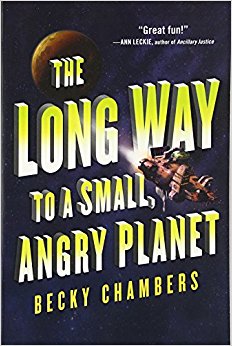To boldly go where someone else has gone before
Ever since Douglas Adams’s Hitchhiker’s Guide to the Galaxy first wooed me into reading adult fiction, I’ve always had a soft spot for the mixture of sci-fi and comedy. So the none-too-serious title of Becky Chambers’s first novel, The Long Way to a Small, Angry Planet, caught my attention from the shelves at University Book Store. And the cover blurb by Ancillary Justice author Ann Leckie — it just reads “Great fun!” — promised exactly what I was looking for in a sci-fi novel.

Long Way doesn’t seem to be interested in breaking any new ground. It’s playing with familiar tropes: a spaceship staffed by misfits and outcasts bumbles into the middle of an interstellar conflict. And that’s okay: Chambers is a deft enough storyteller that she knows when to get out of the way and let the characters lead. Much of the book consists of the reader getting to know and enjoy the crew of the Wayfarer. By the time the central plot is in action, you likely won’t care too much about the stakes — you’ll just be eager to spend more time with these aliens and space-sailors.
That said, some of the tropes in this book hew a little too close to archetypes. Some of these characters — one in particular — feel lifted directly from other space travel stories. Specifically, there’s a character in Long Way who feels hijacked out of Joss Whedon’s cowboy space opera Firefly. At first, it’s a similarity, but after a while it feels too close to be comfortable.
Ultimately, Long Way doesn’t go far enough to distance itself from those who have gone before. Archetypes and tropes are fine to use as shorthand in genre fiction, but you have to do something with those tropes — upturn them, deepen them, blend them together in interesting ways — or else your story just feels like a cover of a cover of a cover, leaving the reader to wonder where they’ve heard this song before. I breezed through Long Way, but I don’t know if I’m going to be back for the just-released sequel unless I’m assured that Chambers finally takes her crew somewhere new for a change.